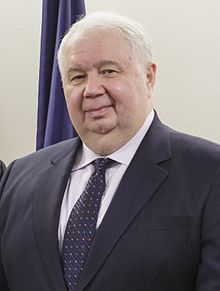Sergey Kislyak | |
|---|---|
Сергей Кисляк | |
 Kislyak in 2016 | |
| Russian Federation Senator from the Republic of Mordovia | |
| Assumed office 20 September 2017 Serving with Pyotr Tultayev | |
| Preceded by | Nikolay Petrushkin |
| Russian Ambassador to the United States | |
| In office 26 July 2008 – 21 August 2017[1] | |
| President | Dmitry Medvedev Vladimir Putin |
| Preceded by | Yuri Ushakov |
| Succeeded by | Anatoly Antonov |
| Deputy Minister of Foreign Affairs | |
| In office 2003–2008 | |
| President | Vladimir Putin Dmitry Medvedev |
| Minister | Igor Ivanov Sergey Lavrov |
| Russian Ambassador to Belgium | |
| In office 25 February 1998 – 28 May 2003 | |
| President | Boris Yeltsin |
| Preceded by | Vitaly Churkin |
| Succeeded by | Vadim Lukov |
| Personal details | |
| Born | Sergey Ivanovich Kislyak Сергей Иванович Кисляк 7 September 1950 Moscow, Soviet Union |
| Nationality | Russian |
| Children | 1[2] |
| Alma mater | Moscow Engineering Physics Institute |
Sergey Ivanovich Kislyak (Russian: Серге́й Ива́нович Кисля́к, IPA: [sʲɪrˈɡʲej ɪˈvanəvʲɪtɕ kʲɪˈslʲak]; born 7 September 1950) is a Russian senior diplomat and politician. Since September 2017, he has represented Mordovia in the Federation Council, the upper chamber of the Russian legislature.[3][4] Previously he served as the Ambassador of Russia to the United States from 2008 to 2017. From 2003 to 2008, he was the Deputy Minister of Foreign Affairs, and from 1998 to 2003, he served as the Ambassador of Russia to Belgium and Russia's Head of Mission to NATO.
Dubbed "the diplomat's diplomat" by CNN, Kislyak was Russia's highest level presence in the U.S. during his nine-year tenure in Washington, D.C.,[5] a period of increasing political tension between the two countries.[6] Kislyak became a key figure in the investigation of Russian interference in the 2016 United States elections, receiving significant media coverage while denying that Russia was behind the hacking of the Democratic National Committee. However, Kislyak's meetings with advisers to then President-elect Donald Trump became a subject of investigation by U.S. intelligence officials.[7] In May 2017, Trump held a meeting with Kislyak and Sergei Lavrov and disclosed classified information about ISIS, an incident which was leaked to the press and became a scandal.[8]
After nearly a decade in the U.S., Kislyak returned to Moscow in July 2017 and was formally relieved of his duties in August,[1] succeeded by Deputy Minister of Foreign Affairs Anatoly Antonov.[9][10]
- ^ a b Указ Президента Российской Федерации от 21.08.2017 № 394 [Decree of the President of the Russian Federation of 21 October 2017 No. 394] (in Russian). Президент России. 21 August 2017. Retrieved 21 August 2017.
Освободить Кисляка Сергея Ивановича от обязанностей Чрезвычайного и Полномочного Посла Российской Федерации в Соединенных Штатах Америки и Постоянного наблюдателя Российской Федерации при Организации американских государств в Вашингтоне, Соединенные Штаты Америки, по совместительству. (To release Sergey Ivanovich Kislyak from the duties as the Ambassador Extraordinary and Plenipotentiary of the Russian Federation to the United States of America and as the Permanent Observer of the Russian Federation of the Organization of American States, concurrently, in Washington, United States of America.)
- ^ Johnson, Alex (March 2, 2017). "Meet Sergey Kislyak, the Shadowy Apparatchik at the Center of Trump's Russia Crisis". NBC News.
All the Russian Foreign Ministry will say about Kislyak (pronounced KEESS-lee-ack) is that he is married with a daughter, that he was trained as an engineer and that he speaks French and English.
- ^ Politov, Yuriy (2017-09-11). "Former Ambassador Sergei Kislyak will become a senator from Mordovia". Rossiyskaya Gazeta. Retrieved 2017-11-04.
- ^ "Former Russian Ambassador Kislyak Joins Parliament". Radio Free Europe/Radio Liberty. 2017-09-27. Retrieved 2017-11-04.
- ^ Lister, Tom (2 March 2017). "Who is Sergey Kislyak, the Russian ambassador to the United States?". CNN.
- ^ Crowley, Michael (March 2, 2017). "Russian Ambassador Sergey Kislyak is Washington's most dangerous diplomat". Politico. Retrieved 28 May 2017.
- ^ "The Latest: FBI examines Kushner meetings with Russians". Associated Press. 25 May 2017. Retrieved 26 May 2017.
- ^ Miller, Greg; Jaffe, Greg (15 May 2017). "Trump revealed highly classified information to Russian foreign minister and ambassador". The Washington Post. Retrieved 26 May 2017.
- ^ "Russia names replacement for Sergei Kislyak as envoy in Washington". Reuters. 21 August 2017. Retrieved 21 August 2017.
- ^ "Кисляк обещает быть полезным Мордовии, если станет сенатором от региона". РИА Новости (in Russian). 22 August 2017. Retrieved 22 August 2017.